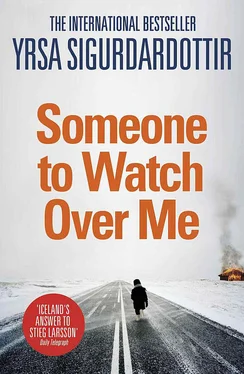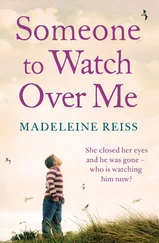Thóra wondered whether she should call the police to check whether they’d got the name yet. It would hardly be much of a surprise, given that Thóra had all but handed them a description of the man, along with a photo, on a silver platter. Her visit to Ragna the previous evening had gone very well. After explaining to the girl what she was looking for, she’d sat down at her bedside and gone through the photos on the Facebook page. Matthew watched the girl’s eye movements and interpreted her reactions. She said no to one face after another until Thóra clicked on a photo of Margeir, Friðleifur and a young man who appeared to be absolutely paralytic – like most of the visitors, in fact. Ragna blinked again and again, which made it hard for Matthew to work out whether she meant yes or no, but she appeared to be very affected by the image. She then shut her eyes tightly and Thóra had to ask her three times whether this third man was the person who’d raped her, each time in a more gentle voice. Eventually the girl opened her eyes, stared at the screen and blinked once. Yes . Then she’d closed them and kept them closed until Thóra and Matthew said goodbye. Before they did, Thóra had told her slowly that she was going to go straight to the police station, and promised her that this man would get what was coming to him. It wouldn’t matter if he denied it, since a DNA sample existed that could confirm his guilt regarding Lísa. Ragna would doubtless need to answer some questions from the police, but the burden of her secret abuse would finally be lifted from her shoulders. Before they left the hospital Thóra had let the duty nurse know what had happened and asked her to keep an eye on Ragna in view of the agitated state that she must now be in.
They’d gone straight from the National Hospital to the police station, and for the third time that day Thóra opened her laptop and logged onto the Facebook page. Unfortunately the officer with whom she’d been in contact regarding the case was otherwise engaged. They either had to come back later or speak to his assistant. She chose the latter option. She felt that she had to report her discovery immediately; the crimes that the bastard in the photo had committed had been hushed up for far too long. As a result she had to tell the story from beginning to end, though she got the impression that the man had already heard some of the details. She was slightly relieved by this, since it meant that the case was at least on the police’s agenda, even though Ragna had responded negatively when Thóra asked whether the police had spoken to her. Nevertheless, the officer did his best not to give anything away, having no doubt studied and practised the technique of letting an interviewee speak uninterrupted in the hope that he or she would say more than he intended. Of course in this case, it was a pointless tactic; Thóra had no desire whatsoever to hide anything from the police. It wasn’t until they came to Thóra’s second visit to Ragna that the police officer’s poker face slipped, in the moment when she showed him the photo of the man Ragna had indicated was guilty. Luckily, the photo had a caption: Good times – Margeir, Friðleifur and Bjarki . Bjarki’s appearance gave no indication that he was a pervert; he looked like a perfectly normal young man, albeit a drunk one. Often the worst of human nature can hide behind the mask of ordinariness.
But now it was the police’s job to find out who this Bjarki was; the name was too common for Thóra to be able to locate him herself. She’d checked to see whether he belonged to the Facebook group; he didn’t, but it was possible to see who had uploaded the photo – a woman who was listed under her full name. Although Thóra had this information, she decided to leave it to the police to contact the woman; there was no point Thóra calling her if it meant that she might ruin the investigation, which would now surely shift into top gear.
Bragi appeared in the doorway. ‘I spoke to the prosecutor but I didn’t get much out of him. The police were given the photos during the last stages of the investigation and there was no clue to the sender’s identity on the envelope. It was covered in fingerprints, since it had gone through the postal system, but none of the prints were in the police database. So no one knows who sent the pictures, although it’s clear that it wasn’t Jósteinn, both because he had no reason to strengthen the case against himself and because he was in custody when they were posted. His mother knew nothing about it. Apparently she came across as extremely unsympathetic in court. In fact the prosecutor thought she’d have had no hesitation in sending the photos herself, since she scarcely seemed to care about her son at all – and probably would have admitted as much. When she testified, it left most people feeling distinctly uneasy. Jósteinn is clearly the product of an abnormal upbringing – if you can call complete indifference an upbringing.’
‘But did this guy know anything about Jósteinn’s relationship with his lawyer; whether they had any conflicts or disputes while the case was being prosecuted?’
‘He said it was impossible to tell. Jósteinn showed no reaction in court; he always stared at his lap and said little or nothing. In fact, he said that he noticed that they never appeared to communicate.’
Thóra thanked him, but sat there thinking for some time after he left, announcing that he could no longer bear the lack of caffeine and had to pop out for a coffee. Maybe Jósteinn’s support of Jakob was nothing more than an act of decency. Nonetheless, she couldn’t shake her conviction that all was not as it seemed when it came to his role in this whole affair. She stood up and walked over to the window in the hope that some fresh air would revive her. The traffic below the window passed by slowly. There seemed to have been an accident; two cars had stopped in one lane and the drivers were bent over their bumpers, apparently in search of dents. One of the drivers looked like he was at the end of his tether. The incessant honking of horns reminded Thóra of modern music: first there was some kind of melody, but then it became increasingly discordant until the noise became the continuous rumble of a cacophonous symphony. Thóra almost didn’t hear her phone ring over the noise coming from the street.
‘Hello,’ she said, after reaching across the table in her haste to answer it before it stopped.
‘Hi,’ said Matthew, sounding unusually tense. ‘Have you looked at the news online?’
‘No, not since this morning. What’s up?’
‘They’ve identified the man found in Nauthólsvík. The one with Margeir’s phone.’
Thóra pressed the receiver closer to her ear. ‘And it’s definitely Margeir?’ She inched round the desk to her chair with some difficulty as the short phone cord inhibited her movement.
‘No.’ Matthew hesitated slightly, probably looking for the name on the screen. ‘He was called Bjarki – Bjarki Emil Jónasson.’
‘Bjarki?’ Thóra sat down and logged onto the Internet. ‘Are you kidding?’
‘No. Of course not. What kind of a joke would that be?’
Thóra didn’t reply, but continued to search for the news. Then she said, ‘It must be the same Bjarki that Ragna identified. It can’t be a coincidence.’
‘That’s why I called.’
Thóra thanked him somewhat distractedly as she read the article. There was little more to learn from it; it stated only that the deceased had been identified and along with his name it gave his age, and the information that he had been unmarried and childless.
The phone rang again and Thóra lifted the receiver without taking her eyes off the screen. ‘What?’ She thought it was Matthew, calling to add something.
Читать дальше












